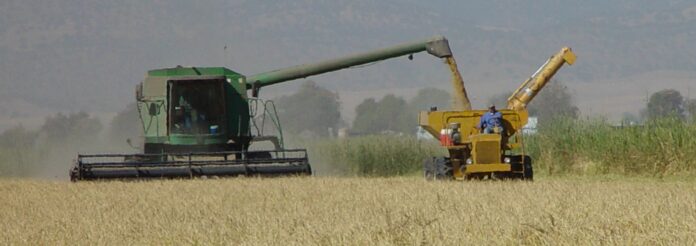 The Glenn-Colusa Irrigation District met at its headquarters on Thursday, November 5, 2020 remotely by telephone from its Willows, California headquarters. Calling in to the conference line was interesting. Before the meeting began everyone was talking so you could hear three or four different conversations; some where discussing how cursive writing is no longer the norm and the advantages of being right handed. They sounded happy with lots of laughter, so that was good to hear. I have not attended this meeting in person and it is going to be a bit tricky to identify who’s talking. So, a little guess work here.
The Glenn-Colusa Irrigation District met at its headquarters on Thursday, November 5, 2020 remotely by telephone from its Willows, California headquarters. Calling in to the conference line was interesting. Before the meeting began everyone was talking so you could hear three or four different conversations; some where discussing how cursive writing is no longer the norm and the advantages of being right handed. They sounded happy with lots of laughter, so that was good to hear. I have not attended this meeting in person and it is going to be a bit tricky to identify who’s talking. So, a little guess work here.
President Donald Bransford called the meeting to order at 9:00am and the consent agenda was approved. That includes paying the bills and approving the minutes.
Administration reports were next starting with maintenance. The audio was a bit garbled and difficult to understand so at public comment I asked a favor of GCID General Manager Thad Bettner to speak with me after the meeting to help shore up the accuracy. Being the gentleman he is that was an ok request.
The following paragraph was provided by Bettner and GCID Communications Director Cynthia Davis;
“Water Operations Superintendent Jered Shipley provided the water operations report next. He explained that GCID, as part of the Sacramento River Settlement Contractors (SRSC) entered into an agreement with the U.S. Bureau of Reclamation (Reclamation) to develop fall water operations that will benefit the salmon population. In exchange, GCID and other participating SRSC will be able to continue to divert water on a limited basis for rice straw decomposition, wetland habitat and fall crops even if Term 91 diversion  restrictions are in place. As of last week, GCID had to reduce diversions significantly and there is some waiting for rice straw decomposition water because part of GCID’s diversion is dedicated to delivering the federal wildlife refuges’ supply as part of a contract. He reported that despite the District’s efforts to communicate this information, many growers were not aware of this and have been frustrated. However, once the situation is explained most growers have been understanding. Discussion took place on the 35,000 to 37,000 acres involved in this program and the fact that more permanent crops, primarily orchards are being planted and will change the fall supply demands in the future.” Thank you very much for helping to clarify Mr. Shipley’s report.
restrictions are in place. As of last week, GCID had to reduce diversions significantly and there is some waiting for rice straw decomposition water because part of GCID’s diversion is dedicated to delivering the federal wildlife refuges’ supply as part of a contract. He reported that despite the District’s efforts to communicate this information, many growers were not aware of this and have been frustrated. However, once the situation is explained most growers have been understanding. Discussion took place on the 35,000 to 37,000 acres involved in this program and the fact that more permanent crops, primarily orchards are being planted and will change the fall supply demands in the future.” Thank you very much for helping to clarify Mr. Shipley’s report.
District Engineer Zac Dickens gave the engineering report. He spoke about district infrastructure and it was a bit difficult to understand him. I guess it really depends on  where the speaker is located in the room as to the audio fidelity or maybe it’s the quality of the micro speakers in my I-Phone. Again GCID staff helped, “He [Dickens] reported that GCID is entering into a construction contract to construct Tuttle Check, which is scheduled to be completed before the completion of the winter maintenance period. Work on the South Cypress Island Side Channel Restoration Project along the Sacramento River immediately downstream of the Cypress Street Bridge in Redding began last week to improve spawning and rearing habitat for Chinook salmon and steelhead in the Sacramento River. The Sacramento River Settlement Contractors, led by Glenn-Colusa Irrigation District and Reclamation District 108, are providing the crew for the side channel construction, with GCID leading the side-channel construction work.”
where the speaker is located in the room as to the audio fidelity or maybe it’s the quality of the micro speakers in my I-Phone. Again GCID staff helped, “He [Dickens] reported that GCID is entering into a construction contract to construct Tuttle Check, which is scheduled to be completed before the completion of the winter maintenance period. Work on the South Cypress Island Side Channel Restoration Project along the Sacramento River immediately downstream of the Cypress Street Bridge in Redding began last week to improve spawning and rearing habitat for Chinook salmon and steelhead in the Sacramento River. The Sacramento River Settlement Contractors, led by Glenn-Colusa Irrigation District and Reclamation District 108, are providing the crew for the side channel construction, with GCID leading the side-channel construction work.”
I believe I heard RNR Construction have returned the best bid and there are late penalties should the firm not complete the work before deliveries. At this point someone showed the board photos of ongoing construction projects. It involves excavation and trail restoration along an old channel or two or three. This is also a joint project and the other districts and entities are cooperating and including in-kind labor.
GCID Water Resources Manager Holly Dawley provided a report and spoke about the Sites Project. It sounded like the opposite of Temperance Flat. Things are happening and folks are engaged and excited.
Next the board considered revision to existing seepage rules and policies. Lateral seepage can be a problem if one grower is flooding a field and the neighbor isn’t. Staff reported this issue is often resolved with better communication amongst growers. It sounded to me as though the current language has evolved over time to provide a pretty fine point on the subject and doesn’t need further revision. Growers need to coordinate between themselves. It was said there has only been one complaint in a very long time. Had there been multiple complaints it might have to be a different story but the Board felt it is a grower issue to be decided between neighbors. Any further tinkering with policy could open up an unintended consequence to the district. It was suggested a letter be drafted to inform growers to that fact should a complaint arise.
The Board was also asked to review revisions to the employee health plans. Staff reminded  the board about the recent workshop going over these in greater detail. There is now a Health Savings Account the district will contribute to in the amount of the deductibles of the Consumer Driven Health Plan. A director asked about certain discrepancies between the premiums of the plans offered. The district covers up to a five percent increase to the employees’ premiums and after that five percent increase the district pays half and the employee pays half. Staff said there hasn’t been a case where the premium has increased more than a few hundred dollars in a year’s time. The board was told the employees are happy with this arrangement and the Board approved enacting the recommended options.
the board about the recent workshop going over these in greater detail. There is now a Health Savings Account the district will contribute to in the amount of the deductibles of the Consumer Driven Health Plan. A director asked about certain discrepancies between the premiums of the plans offered. The district covers up to a five percent increase to the employees’ premiums and after that five percent increase the district pays half and the employee pays half. Staff said there hasn’t been a case where the premium has increased more than a few hundred dollars in a year’s time. The board was told the employees are happy with this arrangement and the Board approved enacting the recommended options.
Meeting reports were next and there were two meetings for the Sites Reservoir last month and they were pretty routine. There was a Sacramento River Settlement Contractors meeting last month and a meeting with Glenn County. A road crossing MOU was discussed and more about that in closed session. There were GSA meetings. It would be interesting to listen in on how a sub basin in a non-critical state, with extra years to develop a GSP will go about things. Have they learned from our trials and experiments? If so what?
A meeting revealed ET rates may need to be updated and staff will go over that and bring it to the board. DWR Groundwater models in the Sacramento Valley for SGMA are using different ET numbers compared to the District’s ET/water rate estimates.
Bransford said the Northern California Water Association won’t increase dues because it has increased membership. NCWA is in the process of hiring a full-time communications person. I hope to meet this person in the near future. The Board asked Bettner about the district’s search for a public relations program. He spoke with NCWA’s GM David Guy and was told there could be some synergy between the two agencies and other member districts.
NCWA meets with conservation groups and I believe it was Bransford who said he received a good education from it. He also said returning to the public relations issue he felt it is an important duty to be engaged in. Bettner said there is also the opportunity for GCID to team up with NCWA and other districts in the area to save costs and increase output.
GCID Attorney Andy Hitchings with Somach, Simmons and Dunn, reported that the plaintiffs’ in the NRDC lawsuit involving the Bureau of Reclamation’s contracts with Sacramento River Settlement Contracts, after being ruled against on the BiOps and Delta smelt consultation have been granted the right to appeal within the next two weeks. It is a bit complex. A ruling on the BiOps placed a stay on certain filings by the corporate law firm known as the NRDC. Now there is an appeals process involving the 9th Circuit which sounds to my layman’s ears as yet another battle involving activist judges and social justice  warriors trying to take away rights, as if a right is negotiable.
warriors trying to take away rights, as if a right is negotiable.
Next month follows on the Thanksgiving holiday with Christmas and New Year’s rounding off the end. GCID is looking to find an alternate date for the December meeting, preferably during the second week of December. Individual directors will be contacted to determine a final date. If they decided on a day I didn’t hear it. But I did hear them go into closed session at about 10:00am. An hour is a good length for a meeting. Not too long, not too short. The agenda lists only four items of them only one had anything to do with a court case and that was anticipated litigation. The rest was property and personnel matters. Good for them. Photo: Rice Harvest by Mary Spooner
DISCLAIMER OF RESPONSIBILITY; Waterwrights.net strives to provide his clients with the most complete, up-to-date, and accurate information available. Nevertheless, Waterwrights.net does not serve as a guarantor of the accuracy or completeness of the information provided, and specifically disclaims any and all responsibility for information that is not accurate, up-to-date, or complete. Waterwrights.net’s clients therefore rely on the accuracy, completeness and timeliness of information from Waterwrights.net entirely at their own risk. The opinions expressed in this report are those of the author and do not represent any advertisers or third parties.
ALL RIGHTS RESERVED. Copyright 2020 by DAW/WaterWrights.net
GLENN COLUSA ID – President Donald R. Bransford, Vice President Peter Knight, John Amaro, Logan Dennis and Blake Vann.
Thaddeus Bettner -General Manager, Zac Dickens – District Engineer, Kevin Nelson – Superintendent.
GCID
344 East Laurel Street
Willows, CA 95988
530/934-8881
contact@gcid.net
From the GCID website: Glenn-Colusa Irrigation District (GCID) is dedicated to providing reliable, affordable water supplies to its landowners and water users, while ensuring the environmental and economic viability of the region. As the largest irrigation district in the Sacramento Valley, GCID has a long history of serving farmers and the agricultural community and maintaining critical wildlife habitat. The District fulfills its mission of efficiently and effectively managing and delivering water through an ever-improving delivery system and responsible policies, while maintaining a deep commitment to sustainable practices. Looking ahead, GCID will remain focused on continuing to deliver a reliable and sustainable water supply by positioning itself to respond proactively, strategically and responsibly to California’s ever-changing water landscape.
































